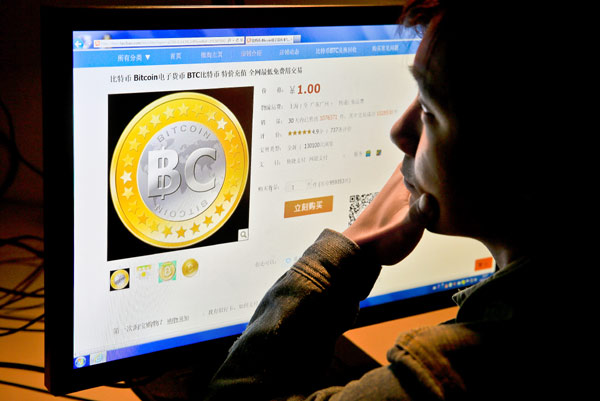

|
 A resident in Guangzhou follows the Bitcoin market on Wednesday. The value of the virtual currency trading on BTC China dived to 2,350 yuan ($385), a 37 percent decrease from the previous day and about 70 percent down from its record high on Dec 1. [Photo / Provided to China Daily] |
BTC China, the world's largest Bitcoin operator by trading volume, said it will no longer accept new deposits in yuan, dealing another setback to the virtual currency.
The announcement on the operator's Sina Weibo account came two weeks after China's central bank said the country's banks were barred from handling Bitcoin transactions.
The platform said that "because of the reasons that everyone knows, BTC China has to temporarily stop its yuan account recharging functions."
Account holders can still top up their accounts using Bitcoins and withdraw yuan, the exchange said.
"BTC China will continue to operate. Please continue to monitor our website, we will try to offer another way to recharge," it said.
The price of the virtual currency slumped after the midday announcement. Bitcoins trading on BTC China dived to 2,350 yuan ($385) per unit by 6 pm on Wednesday, a 37 percent decrease from the previous day, and about 70 percent down from its all-time high on Dec 1.
The People's Bank of China banned financial institutions from handling Bitcoin transactions on Dec 5, opening a space for individual trading of the currency via third-party payment channels.
However, the central bank has also banned domestic third-party payment companies from providing clearing services for virtual currency trading platforms, according to a report in the China Business News on Tuesday.
Tencent Holdings Ltd's Tenpay payment system said it has halted payment and clearance services for Bitcoin exchanges in China in compliance with the new regulations, Tencent said on Wednesday.
Alibaba Group Holding Ltd's Alipay never established a cooperation project with any Bitcoin exchanges, Alipay said on Wednesday.
A senior manager at a major Chinese Bitcoin exchange told China Daily that the exchange's management has been discussing solutions to unblock yuan deposit channels for Bitcoin accounts in the country. The source said it wished to remain anonymous due to the sensitivity of the matter.
"Possible solutions may be asking customers to transfer money through bank accounts in yuan, or in other currencies, to overseas banks or third-party payment accounts. These solutions may expose platforms to cost control higher risks, and they might lose customers due to concerns over capital safety," the source said.
The source said that the trading volumes and prices of the virtual currency have decreased significantly after yuan deposit channels were blocked, but people are not reading too much into that.
"Wild swings of prices and trading volumes are quite normal in the Bitcoin market because of the nature of the digital currency. Bitcoin trading is intrinsically high risk, and prices slump when investors engage in profit-taking activities. This is normal," the source said.
Investors said that trading operations are normal, but price-volatility risks have increased.
"It now takes more effort and time to speculate in the digital currency, and speculators may see a severe impact, but long-term investors will not see many differences," said Shen Yu, 23, a postgraduate student who is majoring in telecommunications at a Beijing university.
Shen said that Bitcoin is a global digital currency, which is traded on the Internet without borders, and that the impact of national regulations is limited.
In August, Germany's Finance Ministry recognized Bitcoin as a "unit of account", meaning that it can be used for tax and trading purposes.
"A large sum of Bitcoin is flowing to exchanges in countries that allow deposits and withdrawals for Bitcoin accounts in local currencies, such as the United States, and Chinese investors can also buy and sell in platforms in those countries," said Shen.